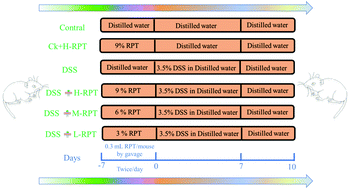Tea consumption has been found to be associated with low incidence of inflammatory bowel disease in Asian countries. However, there is very limited knowledge of such potential protection and its underlying mechanism. Ripened Pu-erh tea (RPT) belongs to the variety of microbial fermented tea, but its function regarding anti-inflammation remains unclear. In the present study, we investigated the effects of RPT on dextran sulfate sodium (DSS)-induced colitis in mice. The results demonstrated that RPT significantly relieved the loss of body weight, disease severity and shortening of colon length, and remarkably inhibited the secretion of pro-inflammatory cytokines by lessening the infiltration of inflammatory cells. Furthermore, we found that RPT suppressed the activation of the NF-κB pathway and down-regulated the expression of HIF-1α. Thus, it was concluded that RPT attenuated the progress of colitis via suppressing the HIF-1α/NF-κB signaling pathways thus reducing inflammation. This suggests that RPT may be a potential anti-inflammatory nutraceutical for the prevention and treatment of colonic colitis.

